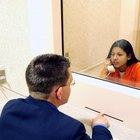
When one parent makes negative comments about the other to their child, it is never going to have a positive effect. While smallish snippy comments such as, "Dad never remembers to clean up his mess" may not seem to have the same impact that more intense talk does -- such as, "Your mother is a terrible person and a bad parent" -- either type of speech can damage relationships and make him wonder if those sentiments carry over to him, too.
Respecting Relationships
Don't forget that your child has a relationship with both parents. When one parent speaks negatively about the other, the child's relationship with that parent isn't being respected. According to the American Academy of Pediatrics' HealthyChildren.org website, it's important to avoid criticizing each other in front of your child or involving him in the argument; your child may feel like he has to choose sides or that he shouldn't have a close relationship with both parents. It can also upset your child because half of him comes from each parent, so negative comments can reflect back on the child.
Role Model
Your child takes cues from your behavior. Talking negatively about the other parent doesn't give her a positive example of appropriate communication. Your child may begin to think that it's acceptable to say mean things about others behind their back or verbally insult others. Although some amount of disagreement is normal within every relationship, finding a balance between expressing frustration and kind or loving acts is essential. If you're married or still with the other parent, apologize to your partner for your ill-conceived words, verbally and with an affectionate gesture, where your child can see. Divorced or separated couples can also verbally apologize in front of the child. If you're the parent who is being insulted, don't lash back at the other adult. Calmly explain to your spouse or ex that this type of speech is inappropriate and hurtful.
Making Adjustments
According to the pediatric professionals at the KidsHealth website, if you and your spouse are splitting up, it's important to work to create a comforting and caring environment to help ease this major life adjustment, refraining from involving your child in your frustrations with his other parent. If his other parent talks badly about you, let him know that sometimes grown-ups act out when they feel frustrated and suggest he ask his other parent to stop, if it is bothering him. Explain to your child that he doesn't have to choose sides, and that your ex's insults aren't going to affect where your child lives or how much time he spends with you.
The Child's Emotions
It's common for kids to feel angry or depressed during a divorce or periods of marital strife. Negative speech about the other parent -- whether it's you talking badly about her dad or dad insulting you -- can compound these emotions, making the child feel worse about the situation. Although avoiding any negative speech about a spouse or ex is ideal, sometimes words slip out that may hurt both the adult and the child alike. Talk honestly and openly to your child about the hurtful words, letting her know that when parents say mean words to or about each other it is never the child's fault. Ask her how she feels and what she needs to feel better about the situation. The offending parent should also apologize to the child for upsetting her and bringing her into an adult situation.
Related Articles

Psychological Effects of Fatherlessness

How to Stop Fighting Among Older Adult ...

Is Talking With Your Ex-Spouse Normal?

Barriers to Communication with Kids

The Negative Effects of Extramarital ...

Positive and Negative Aspects of ...

How to Deal With a Spouse Who Is ...

How to Make a Bar Mitzvah Speech for ...

Aggressive Behavior in Adults

Who Gets Invited to a Wedding Rehearsal ...

How to Get Over a Long Term ...

Signs of Disconnected Couples

Wedding Etiquette for Stepparents

Signs You Are Married to a Bully

Ideas for Retirement Toasts

How to Deal With Your Boyfriend's Crazy ...

How to Comfort a Friend Whose Child Has ...

How to Deal With an Adult Daughter ...

Why You Don't Yell at Your Parents

How to Fix a Broken Sibling Relationship
References
Writer Bio
Based in Pittsburgh, Erica Loop has been writing education, child development and parenting articles since 2009. Her articles have appeared in "Pittsburgh Parent Magazine" and the website PBS Parents. She has a Master of Science in applied developmental psychology from the University of Pittsburgh's School of Education.
Photo Credits
Goodshoot/Goodshoot/Getty Images